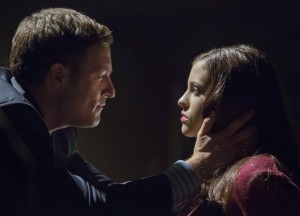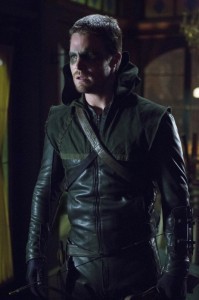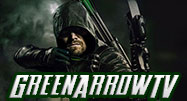

Arrow #1.7 “Muse of Fire” Recap & Review
Recaps & Reviews November 29, 2012 Derek B. Gayle

 Summary: The Huntress, Geoff Johns, John Barrowman’s identity and more meant this was one of the most anticipated of the season. Yet even with everything going for it, some poor performances and clunkiness keep it from living up to the hype.
Summary: The Huntress, Geoff Johns, John Barrowman’s identity and more meant this was one of the most anticipated of the season. Yet even with everything going for it, some poor performances and clunkiness keep it from living up to the hype.
If you have not seen this episode yet and do not wish to be spoiled, do not continue reading!
Recap
Moira is caught in the crossfire when a mysterious shooter kills a man she was meeting with. Oliver wants to track down the shooter for vengeance, and discovers that the victim is involved in the mob. During his investigation, Oliver makes a connection with mob boss Frank Bertinelli’s daughter, Helena, only to discover that she is the shooter, seeking to take down her father after her fiancée was murdered. After a brief kidnapping and escape, Helena also discover’s Oliver’s identity, and they realize how much their motivations and mindsets are in common, leading to a kiss. Meanwhile, Tommy tries to get things started with Laurel, but is halted by his father—revealed to be The Well Dressed Man—who has frozen his funds out of disappointment. Thea tries to understand Oliver, and Walter returns to be by Moira’s side.
Read an in-depth recap on our handy episode guide!
Review
Geoff Johns is an interesting writer when it comes to TV, because his comic experience abundantly shows. Comic book writers have to be good at creating mini-cliffhangers for every page and every issue, and as such, Johns’s act breaks for his first episode of Arrow are particularly phenomenal. However, words written in a comic don’t always play perfectly when spoken out loud. This particular episode’s dialogue wasn’t as noticeably different as when Johns wrote some Smallville episodes, but Johns did leave his sometimes over-the-top mark.
Particularly, Oliver and Helena’s discussions about crucibles and “love becoming hate,” or Tahmoh Penikett’s somewhat cartoony threats, didn’t feel much like words a person would speak, but did feel like words you’d read in a comic. This kind of writing hindered Johns’s Smallville episodes a bit by sometimes bringing them too far into the stilited comic book world. But in a weird way, it benefits Arrow, as it’s still finding its identity beyond just a generic gritty action show. Not yet at the halfway point of its freshmen season, it can still stretch its legs a bit and try out some different things without feeling like it’s betraying itself. As such, this episode felt oddly fresh, and the pace was surprisingly fast and tense for an episode with an otherwise basic plot structure.
It didn’t, however, help that the performances weren’t as strong as usual. It’s necessary to go easy on guest stars sometimes, but when it’s a character both as hyped and seemingly important as Helena Bertinelli, the curve needs to be a bit higher. Jessica De Gouw, unfortunately, didn’t live up to that hype. Her voice has a breathiness that harkens back to Kristin Kreuk’s earliest days on Smallville, but while Kreuk seemed to speak that way deliberately to portray vulnerability, it doesn’t really fit De Gouw’s character. Perhaps she was trying to bring out a similar vulnerability to let Helena grow, but if that’s the case, it didn’t work. Instead, it makes her feel weak and kind of awkwardly sensual in places she really shouldn’t be.
De Gouw’s performance when she reveals she knows Oliver’s identity is also less than stellar; for example, when Oliver asks why she’s crying, De Gouw just kind of shifts between cuts from angry to sad without any transition beforehand. Don’t get me wrong, she’s not terrible, and in fact it’s possible that De Gouw had trouble adapting to John’s dialogue style. That, in addition to the awkward crying, could very well be the fault of the director, David Grossman, who shot the episode just fine but didn’t seem to do well with improving performances. And luckily, what De Gouw lacked in skill to play the character, she did make up for by having some chemistry with Amell, not to mention pulling off some decent fight stunts.
Admittedly, De Gouw also didn’t always have the best material to work with character-wise. While Johns’s structural writing was consistent, some of the broader character beats for Helena were hit-or-miss. Helena is obviously the first foil we have for Oliver; they have clear parallels (right down to quoting the same lines and breaking out of zipties the same way.) But Helena is more raw than Oliver, closer to the vengeful murderous vigilante he was in the first couple of episodes. It’s odd that we’re getting a mirror to who Oliver is versus who he was (sort of another mini-theme this week) a mere seven episodes in, but it’s a testament to how much the show has tried to grow Oliver in such a short span of time. Oliver still seems okay with killing when he’s really really angry (he says “he’s a dead man” in this very episode) but Diggle’s interventions have made him more thoughtful about how he goes about his vigilantism.
At the same time, Oliver still doesn’t seem like he’s grown enough to be too different from Helena; certainly not enough to give her a big speech on revenge vs. justice, which I’m sure Diggle would call BS on Oliver about. It does, however, give some credence to why Oliver would still end the episode making out with her. The problem is that Helena is so heavy-handed about how she and Oliver are alike. Having your fiancée murdered and being stranded on an island five years are two very different experiences, but she hammers in how it makes them so similar, only they understand each other, etc. The thing is, parallels were already clear in their actions; there was no reason to try to spell it out and awkwardly compare their origins and motivations.
Though Tahmoh Penikett’s role as Tom Salvanti wasn’t as important as Helena, Penikett himself is a genre favorite, being a Battlestar Galactica, Smallville and Dollhouse alum. He hams it up here as a mobster, which is quite a lot of fun taken by its own merits. The trouble is, the hammy mobster throwing out over-the-top threats doesn’t really fit in with Arrow as it’s been presented. It’s kind of forgivable, since I just mentioned how the show is allowed to stretch its legs, but there needs to be a limit for how over-the-top it wants to go, and Penikett chewed the scenery a little too hard. Considering his pedigree, this might be another indication that it’s the fault of director Grossman, this time.
The reveals this episode, though either spoiled or relatively unsurprising thanks to the internet, were still well done for what they were. The reveal that the shooter is Frank Bertinelli’s own daughter, for example, would have been quite shocking for anyone not spoiled by the description. The one everyone was waiting for, of course, was John Barrowman’s identity, and I’m quite pleased that it was a somewhat quiet reveal. As soon as Tommy said “Dad!” to the fencing men, it was plenty obvious who’d be under the mask, so it’s nice that the show didn’t try to add blatant swelling music to undercut it.
 It’s actually a relief that Barrowman wasn’t revealed as a notable DC character. Finding out Barrowman was playing Green Lantern or Batman or some other surprise DC player would have been cool in a meta way, but it’s more important that the reveal comes out of how we know these characters and how it might affect the show. In that sense, it succeeded, because this might be the most excited I’ve been for the ongoing story since Moira was revealed to be in the scheme back in the pilot. Being Tommy’s father is meant to be an emotional reveal, which is important for these characters that we’re supposed to be (or getting to be) invested in. This also makes the continuing story arc much more interesting than just a “secret society of mean rich people” kind of thing. Involving both the Queen and Merlyn families is bound to lead to tension from numerous sides, with bigger possibilities for who can find out what secrets and who will end up on whose side. Additionally, Colin Donnell has been the least relevant cast member thus far, so hopefully roping Tommy into the story through his father means he’ll have more to do.
It’s actually a relief that Barrowman wasn’t revealed as a notable DC character. Finding out Barrowman was playing Green Lantern or Batman or some other surprise DC player would have been cool in a meta way, but it’s more important that the reveal comes out of how we know these characters and how it might affect the show. In that sense, it succeeded, because this might be the most excited I’ve been for the ongoing story since Moira was revealed to be in the scheme back in the pilot. Being Tommy’s father is meant to be an emotional reveal, which is important for these characters that we’re supposed to be (or getting to be) invested in. This also makes the continuing story arc much more interesting than just a “secret society of mean rich people” kind of thing. Involving both the Queen and Merlyn families is bound to lead to tension from numerous sides, with bigger possibilities for who can find out what secrets and who will end up on whose side. Additionally, Colin Donnell has been the least relevant cast member thus far, so hopefully roping Tommy into the story through his father means he’ll have more to do.
The supporting cast wasn’t given much to do this week, each one did get a nice character beat or two (save for Laurel.) Willa Holland has been a big surprise in the past few weeks, even while retreading some old material for Thea. It’ll get old really quickly if Thea keeps doing the “mad at Oliver but apologizes by the end” shtick, but for now it’s being handled with some merit. Thea’s anger does stem from legitimate suspicion, because she’s smart enough to connect the dots. We also got follow-up to Detective Lance’s troubled investigation from “Damaged,” which was a nice closing of that plot thread and shined a light on Lance’s nobility. Unfortunately, it also paints Oliver’s ploy in an even more negative light, considering how guilty Lance is about it, but that complexity makes it all the more engaging. Seeing Walter return was also a big surprise, and fuels more of the potential tension for the overall story arc.
“Muse of Fire” probably can’t be fully judged until we see the Helena story continue (conclude?) next week. But as it stands, it’s an average episode shot upwards by some great reveals, developments and pacing, only to be brought back down to average by weak performances. Hopefully De Gouw’s performance improves and Helena becomes a better fleshed out character during her second outing, because improving those two points alone would have made this episode one of the best. But considering what all it has going for it, it’s not nearly as stellar as it could be.
Odds & Ends
- It’s hard to go too in-depth about Stephen Amell in these reviews sometimes because he’s generally very consistent each week. Tonight was no different—Amell is still solid in the role.
- Katie Cassidy as Laurel, on the other hand, seems to be the weak link in the cast. Sometimes Laurel isn’t written well, other times Cassidy just portrays her too blandly. In an episode where every character has at least one memorable moment or development, it’s evident that Laurel has very little, and Cassidy doesn’t make what she does have interesting at all. This needs to change very, very soon.
- Despite my misgivings about Laurel thus far, I have to give credit to the show for turning the standard love triangle fare into something rather sweet between Tommy and Laurel. Kudos to the show for not making it too soapy (well…so far.)
- Attention TV bad guys: You should have learned by now that zipties do not work. (Remember when Smallville put ziptie cuffs on Doomsday?)
- China White’s brief cameo was a nice way to tie in the bigger world the show has already established.
- “Oliver Queen, the rich man’s Lindsay Lohan.” I wonder if they realized Lohan would be back in the spotlight for Liz & Dick the same week this aired?
A SECOND OPINION
by Matt Tucker
One of the most intriguing aspects of Arrow so far is the confidence with which the show presents itself. Nowhere is this more on display than in the pacing, something that can actually be separated into two paths. The first is the overall pacing of events, which the show is notable for not wasting time or dragging out developments in inorganic fashion. Some worry that the show might be burning through story too quickly but it seems to indicate a wealth of material with which to work.
The second path of pacing is one of the defining elements of this particular episode. Comfortable in its skin, there is actually a bit of leisure taken with the way things unfold this time out, allowing for a scene like Oliver and Helena’s dinner to breathe. In a way, though the fanbase hates to hear such a thing, the show seems to be approaching its more serialized nature like a soap opera. It’s a very effective technique that allows for much more connection for the audience.
That said, the final scene between Oliver and Helena felt forced as a way to punctuate the episode. Their unique interaction with each other was building a lot of goodwill throughout the hour but the attraction felt like it was on a slower burn. That made the make-out session too abrupt to believably invest in. One has to wonder if the currently planned two-episode arc for the Huntress made them feel they had to force their hand here.
As the series continues to build its criminal world and the interplay between the different factions — the Triads, the mob that Bertinelli represents, Papa Merlyn’s and Mama Queen’s Illuminati — gets more intricate, Oliver’s quest becomes more dire and the series more rich. It’s fascinating to see China White once again relegated to a supporting role this episode and realizing they are building to something big and quite encompassing as the season rolls on.
Note should be made of Tommy and Laurel and the wonderful connection they are building between the two characters. For now, it’s much more compelling, real, and powerful than the chemistry between Laurel and Ollie. Those two, along with the gracefully deepening relationship between Moira and Walter, are building a strong emotional base to complement the action and noirish attributes of the show. Most important is the focus on those connections in relation to Oliver and the effects they have on his emotional growth.
Though dialogue was a tad clunky — something of a trademark of Geoff Johns’ television work — and that final scene felt pushed on the audience, the introduction of the Huntress to shine a light on Oliver’s cause was a success. The reveal of Barrowman’s character as Tommy’s father wasn’t anticlimactic, per se, but felt obvious and inevitable, though welcome, when all is said and done. Blackthorne seemed to have an identity crisis again this episode, with Lance alternating between ’40s cop flick and a grounded, grizzled character. And Amell is a pure badass when given the physical challenges of Oliver’s journey. That opening sequence chase was a fantastic setpiece.















